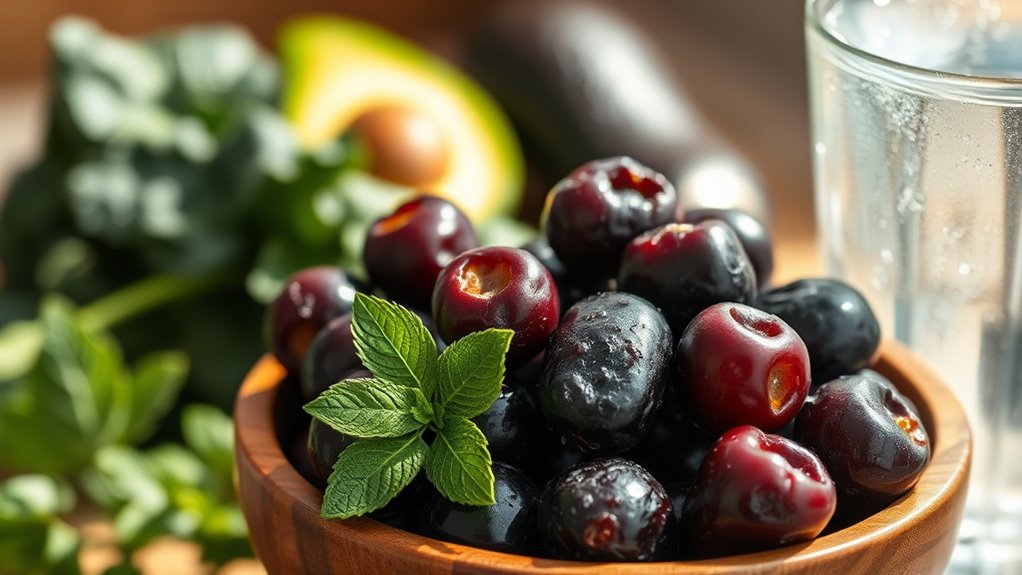Simple Remedies for That Stubborn Constipation
If you’re struggling with stubborn constipation, you’re not alone. Many people face this uncomfortable issue, but there are simple remedies that can help ease your discomfort. By making a few adjustments to your diet and lifestyle, you can promote regularity and find relief. Curious about how fiber, hydration, and probiotics can work together to improve your digestive health? Let’s explore these effective strategies and more.
Key Takeaways
- Increase fiber intake by consuming fruits, vegetables, whole grains, and legumes to aid stool passage.
- Stay hydrated by drinking at least eight glasses of water daily to soften stool and support digestion.
- Incorporate probiotics from yogurt, kefir, or fermented foods to improve gut health and promote regular bowel movements.
- Use bulk-forming agents like psyllium husk or natural stimulants such as senna to relieve constipation effectively.
- Establish a routine with consistent meal times, hydration, and moderate exercise to enhance digestive health and regularity.
Increase Your Fiber Intake
One of the simplest yet most effective ways to relieve constipation is by increasing your fiber intake. Fiber adds bulk to your stool, making it easier to pass.
You can find fiber in fruits, vegetables, whole grains, and legumes.
Start your day with a high-fiber breakfast, like oatmeal or whole-grain toast, and snack on fruits like apples or berries. Incorporating beans into your meals can also boost your fiber levels.
Remember, variety is key; mix different sources to keep your meals exciting. Additionally, high-fiber foods such as leafy greens and legumes can significantly enhance your digestive health.
Stay Hydrated
How often do you think about the role hydration plays in your digestive health?
Staying hydrated is essential for keeping things moving in your intestines.
Water helps soften stool, making it easier to pass.
Aim for at least eight glasses a day, but adjust based on your activity level and climate.
You might also consider incorporating hydrating foods like cucumbers and watermelon into your diet.
If you’re feeling constipated, don’t underestimate the power of a simple glass of water.
It’s a quick and effective remedy that can greatly improve your digestion and overall well-being. Additionally, maintaining adequate hydration supports overall health and digestion.
Incorporate Probiotics
Incorporating probiotics into your diet can greatly improve your digestive health and help relieve constipation.
These beneficial bacteria enhance gut function, making it easier for your body to process food. Regular consumption of probiotics can lead to fewer digestive issues, including bloating and gas. Let’s explore the best sources of probiotics and how much you should be consuming for best results.
Benefits of Probiotics
Have you ever wondered how probiotics can transform your digestive health? These beneficial bacteria work wonders by balancing your gut flora, enhancing digestion, and improving nutrient absorption. They can also help prevent constipation by promoting regular bowel movements and reducing bloating.
Here’s a quick look at some key benefits:
| Benefit | Description |
|---|---|
| Improved Digestion | Breaks down food efficiently |
| Regular Bowel Movements | Encourages consistent elimination |
| Enhanced Nutrient Absorption | Maximizes vitamins and minerals intake |
Incorporating probiotics into your routine can lead to a healthier, happier gut!
Best Probiotic Sources
When it comes to reaping the benefits of probiotics, knowing where to find them is key.
You can boost your gut health by incorporating fermented foods into your diet. Yogurt, especially those labeled with live cultures, is a delicious choice. Other excellent sources include kefir, sauerkraut, kimchi, and miso.
If you prefer a quick option, consider probiotic-rich drinks or supplements. Additionally, some cheeses, like Gouda and cheddar, also contain probiotics.
Probiotic Dosage Recommendations
Wondering how much probiotics you should take for ideal gut health?
The dosage can vary, but here are some general guidelines:
- For general health: Aim for 1-10 billion CFUs (colony-forming units) daily.
- For constipation relief: Consider 10-20 billion CFUs per day, focusing on strains like Bifidobacterium and Lactobacillus.
- For antibiotic recovery: Increase intake to 20-50 billion CFUs while on antibiotics and for a few weeks after.
- Consult a doctor: Always check with your healthcare provider for personalized recommendations based on your specific needs.
Start integrating the right dosage to support your gut health effectively!
Engage in Regular Physical Activity
Incorporating regular physical activity into your routine can greatly alleviate constipation. Exercise stimulates your digestive system, helping food move through your intestines more efficiently.
Aim for at least 30 minutes of moderate activity most days—walking, jogging, cycling, or even dancing can make a difference. You don’t have to hit the gym; simple activities like gardening or playing with your kids count too!
Additionally, engaging in gentle yoga poses can further enhance digestive movement. Listen to your body and find activities you enjoy, as this will keep you motivated. Remember, consistency is key. So, get moving, and you’ll likely find relief from that stubborn constipation in no time!
Establish a Routine
Establishing a routine can greatly improve your digestive health.
By keeping consistent meal times, starting your day with hydration, and scheduling regular exercise, you create a rhythm that supports your body’s natural processes. Additionally, maintaining a balanced diet rich in fiber can further enhance digestion and alleviate constipation.
Consistent Meal Times
Regularly setting consistent meal times can greatly enhance your digestive health and help alleviate constipation.
By establishing a routine, you signal your body when it’s time to digest food, promoting regular bowel movements.
Here are four tips to get started:
- Choose Specific Times: Aim for the same breakfast, lunch, and dinner times each day.
- Limit Snacking: Reduce between-meal snacks to maintain a clear eating schedule.
- Plan Meals: Prepare meals ahead of time to avoid last-minute unhealthy choices.
- Stay Mindful: Focus on your food during meals to improve digestion and satiety.
Stick to your routine, and your body will thank you!
Morning Hydration Habit
How can a simple glass of water transform your morning routine? Starting your day with hydration kick-starts your metabolism and aids digestion. Make it a habit to drink water first thing each morning; it can greatly help with constipation.
| Time | Action | Benefits |
|---|---|---|
| Upon Waking | Drink a glass of water | Rehydrates your body |
| 15 Minutes Later | Enjoy a healthy breakfast | Promotes digestive health |
| After Breakfast | Follow up with more water | Supports regularity |
Regular Exercise Schedule
Incorporating a consistent exercise routine can greatly enhance your digestive health and alleviate constipation.
Establishing a regular schedule helps stimulate your bowels and promotes overall well-being.
Here’s how to get started:
-
Choose Activities You Enjoy: Whether it’s walking, cycling, or yoga, make it fun!
-
Aim for 30 Minutes: Aim for at least 30 minutes of moderate exercise most days.
-
Incorporate Strength Training: Add muscle-strengthening activities twice a week.
-
Set a Specific Time: Consistency is key—find a time that works best for you.
Stick to this routine, and you’ll likely notice improvements in your digestion.
Try Natural Laxatives
If you’re looking for gentle relief from constipation, natural laxatives might just be your best bet. These options can help stimulate your digestive system without harsh side effects. Here are some effective natural laxatives you can consider:
| Natural Laxative | Benefits |
|---|---|
| Prunes | High in fiber |
| Flaxseeds | Omega-3 fatty acids |
| Chia seeds | Absorb water, increase bulk |
| Aloe vera | Soothes the digestive tract |
| Psyllium husk | Promotes regularity |
Incorporating these into your diet can provide that extra push you need for regular bowel movements. Additionally, consuming fiber-rich foods can further support your digestive health and prevent constipation.
Consider Herbal Remedies
Natural laxatives can be a great start, but you might also want to explore herbal remedies for constipation relief.
These remedies can support digestive health and ease discomfort.
Here are some effective options:
- Senna: A natural stimulant laxative that encourages bowel movements.
- Psyllium: A soluble fiber that adds bulk to your stool, making it easier to pass.
- Aloe Vera: Known for its soothing properties, it can help relieve constipation.
- Dandelion Root: Promotes digestion and acts as a mild laxative.
In addition to these herbs, proper hydration is essential for effective digestive wellness as it aids in food breakdown and nutrient absorption.
Always consult a healthcare professional before trying new herbs, especially if you’re on medication.




